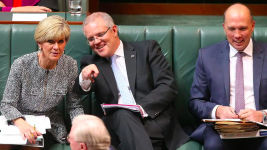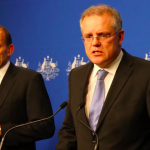Silencing Dissent: Morrison Threatens to Deregister Trade Union

Reigning Australian prime minister Scott Morrison has threatened to close down the Construction, Forestry, Maritime, Mining and Energy Union (CFMMEU), following a union boss’ tweet that the head of the executive said was the last straw that broke “the camel’s back.”
On Father’s Day, Victorian state secretary of the CFMMEU’s construction and general division John Setka posted a tweet of his two kids holding up a sign telling the Australian Building and Construction Commission (ABCC) to “go get fucked.”
Above the photo of his children, Mr Setka wrote a message aimed at the ABCC that read, “Leave our dads alone and go catch some real criminals you cowards.”
In an interview with 2GB’s Alan Jones on the following day, Mr Morrison got on his moralising soapbox once again stating that “when you see children being used in these sorts of protests” it “just makes your skin crawl.”
The PM confirmed that he’d consider deregistering the union. Morrison then went onto say on 3AW later that day that he wasn’t going to “rush into anything,” but he was seriously looking into it. And he’d discuss any action to be taken with industrial relations minister Kelly O’Dwyer.
Now, this is a fairly substantial threat to make over a tongue-in-cheek social media message. But, the reality is that this one-off tweet was just an excuse for the new prime minister to take a fresh swipe at unions, in continuation with the Coalition’s ongoing assault on the movement.
At a time of vulnerability
Following the leadership spill, the Coalition is on shaky ground with floundering support, and so, not only was the tweet scandal a reason for the government to flex its muscle in the direction of the unions, but it also provided it with a means to attack Bill Shorten.
As Michelle Grattan pointed out in the Conversation, the CFMMEU has provided Shorten with vital support over recent years. And the PM implied last week that the opposition leader is so embroiled in the trade union movement that he should remove himself from its “warm embrace.”
“Bill Shorten’s got his arms all around John Setka. John Setka’s got his arms all around Bill Shorten,” Morrison told 3AW. “Bill Shorten is union bred, union fed and union led, and that’s how he will run Australia.”
Reclaiming the right to protest
Following the fallout over Morrison’s response to the tweet, 5,000 building and construction workers took to the Sydney streets last Thursday calling for an end to the ABCC. And the police were forced to close CBD streets as protesters veered off the sanctioned demonstration route.
NSW treasurer Dominic Perrottet criticised the protesters for using “bully tactics to ride roughshod to get what they want with no regard for the community.”
While president of the NSW CFMMEU construction division Rita Mallia said “the continued existence of the ABCC… attacks our members’ ability to negotiate good wages and conditions.” She further stated that the commission hindered “their right to be active in their union.”
Tightening the screws
The ABCC is an oversight body specifically designed to apply separate industrial laws to the building and construction industry. The establishment of the watchdog was a 2003 Cole royal commission recommendation aimed at combating lawlessness in the building industry.
The Howard government brought in the statutory authority in October 2005. And the legislation that established the commission also broadened the range of industrial actions that were classed as illegal and it increased penalties in the industry.
However, the Gillard government abolished it in 2012, replacing the body with Fair Work Building and Construction, which was a less aggressive version of the regulatory body that no longer had the power to restrict industry specific industrial action.
Following his election as prime minister, Tony Abbott proposed bringing back the ABCC in November 2013. But, the proposal was blocked by the Senate in August 2015. And Turnbull’s re-introduction of the ABCC legislation was also blocked in May the following year.
But, the Coalition government was so set on the oversight body being re-established that Turnbull called a double dissolution election over the issue in July 2016, in which his government maintained power by a slim majority.
And in November that year, the Turnbull government finally got the ABCC legislation passed through parliament with the support of crossbenchers. And on 2 December, the ABCC commenced operating once again.
When breaking the law is just
Union boss John Setka is no stranger to controversy. In May this year, blackmail charges that were brought against him and the CFMMEU’s Shaun Reardon were dropped. The charges were in relation to alleged threats they made to take industrial action against Boral.
After the prosecution dropped the charges, Mr Setka appeared in a pre-recorded Sky News interview stating that unions sometimes achieve great success for their members by breaking laws. He said that bad laws needed to be broken or nothing is achieved.
Bill Shorten – who has promised that a Labor government will abolish the ABCC yet again – distanced himself from Setka’s comments stating that he didn’t think it was necessary to break the law and he wouldn’t protect anyone who did.
But, Mr Setka’s sentiments are not without their supporters within the union movement. Last year, ACTU secretary Sally McManus caused a stir when she remarked that she had no problem with workers breaking “unjust laws.”
Changing the rules
Indeed, the Coalition might be feeling under threat from the union movement as it’s on the rise again. The ACTU-led Change the Rules campaign, which aims to bring about pro-worker reforms to the nation’s industrial relations laws, has been gaining momentum since it began last September.
Workers are beginning to mobilise against changes over recent decades that have left this nation with some of the most restrictive industrial relation laws in the developed world. Current laws prohibit a range of strikes, as well as requiring the full disclosure of the nature and timing of actions.
Indeed, back when industrial action was at its most powerful, workers didn’t wait for governments to give them the nod, rather they took to the streets regardless of the legalities of striking and demanded better rates and conditions, or else the system would come grinding to a halt.







